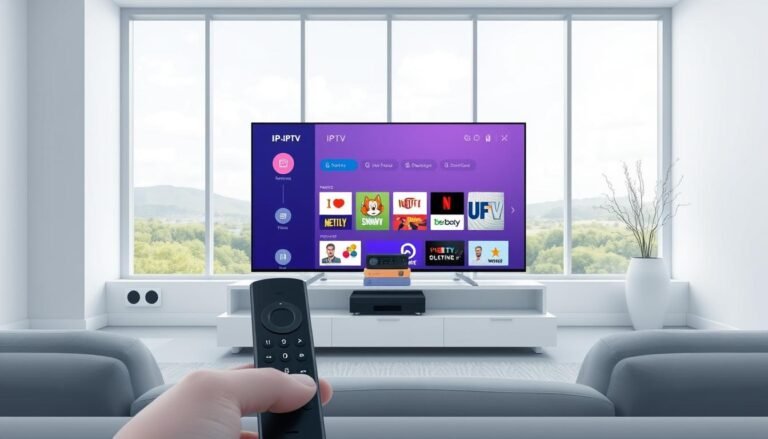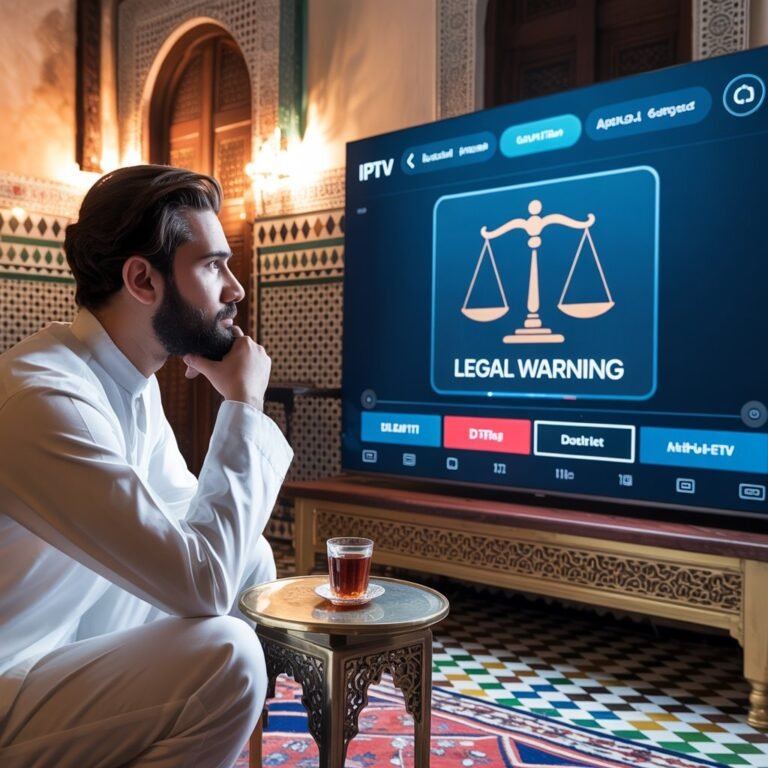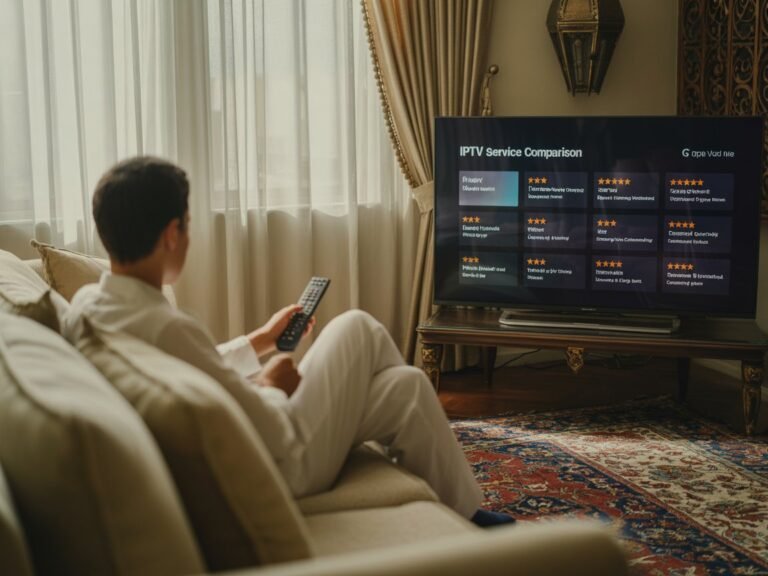Is IPTV Legal in the USA? Laws Explained Simply

You’ve probably heard about IPTV services but may be unsure about their legality in the United States. When looking for ways to stream your favorite shows and sports, you might wonder about the laws. It’s natural to have these questions.
It’s important to understand IPTV laws to make smart choices about the services you use. The legality of IPTV in the USA depends on several things. These include the type of content streamed and the licensing agreements.
As you explore IPTV, knowing the laws that apply is key. This article will simplify the complex issues of IPTV legality. You’ll get a clear picture of what you need to know.
Key Takeaways
- Understanding the factors that determine IPTV legality in the USA.
- Learning about the laws that govern IPTV services.
- Discovering how to make informed decisions about IPTV providers.
- Knowing what to look for in a legitimate IPTV service.
- Avoiding potential legal issues with IPTV usage.
Understanding IPTV: What It Is and How It Works
When you dive into TV streaming, you might hear about IPTV. But what does it mean? IPTV, or Internet Protocol Television, sends TV shows over the internet. It’s different from old-school TV, satellite, or cable.
Definition of IPTV Technology
IPTV uses internet protocol to stream TV to your device. You can watch TV on smart TVs, computers, and phones with internet. The IPTV definition also talks about how it changes TV watching.
Different Types of IPTV Services
There are many IPTV services out there, each with its own style.
Subscription-Based Services
These services need a monthly or yearly fee. They offer lots of channels, like sports, movies, and shows from other countries.
Free IPTV Options
Some IPTV services are free, with ads to support them. They might not have as much content as paid services. But they’re great for those who want free TV.

How IPTV Differs from Traditional Cable
Comparing IPTV vs traditional cable shows some big differences. IPTV lets you watch TV on many devices and offers on-demand shows. Traditional cable is more limited in device choice and schedule.
Knowing these differences helps you choose the best service for you.
Is IPTV Legal in the USA? The Simple Answer
To figure out if IPTV is legal in the USA, we need to look at the type of content it streams. It also depends on if the service provider has the right to offer it.
The Legality Spectrum of IPTV
IPTV falls on a legality scale. Legitimate services stream licensed content, like traditional cable but online. On the other side, services that share copyrighted material without permission are illegal.
“The key difference is the content and who has the right to share it.” A report shows more people in the US are using IPTV. This highlights the need for clear rules about its legality.
When IPTV Is Definitely Legal
IPTV is legal if it has the right licenses and follows copyright laws. For example, Hulu and Sling TV are legal IPTV options. They give users a legal way to watch TV instead of traditional methods.
When IPTV Crosses into Illegal Territory
IPTV becomes illegal when it shares content without permission or streams pirated material.
Unauthorized Content Distribution
This happens when IPTV services share copyrighted material without the right permissions. Breaking copyright laws can lead to legal trouble.
Pirated Streams
Pirated streams are when copyrighted content, like live sports or TV shows, are shared without permission. Watching or providing such content is against the law and can cause penalties.
As the FCC points out,
“Piracy is a serious issue that affects the entire television ecosystem.”
This shows why it’s crucial to pick legal IPTV services.
Key US Laws Governing IPTV Services
Understanding IPTV laws in the US is key. As IPTV grows, knowing the legal rules is vital for both providers and users.
Copyright Act and Digital Millennium Copyright Act (DMCA)
The Copyright Act and DMCA are crucial for IPTV legality. The Copyright Act protects original works like movies and music. The DMCA stops the bypassing of copyright protection and limits the blame for online service providers for copyright issues.
IPTV services must get the right licenses for content. Not doing so can lead to big legal troubles. The DMCA also requires IPTV providers to stop copyright infringement.
| Aspect | Copyright Act | DMCA |
|---|---|---|
| Primary Focus | Protects original works | Prohibits circumvention of copyright protections |
| Impact on IPTV | Requires licensing for distributed content | Requires measures to prevent copyright infringement |
| Consequences of Non-Compliance | Fines, lawsuits for copyright infringement | Liability for circumvention, potential loss of safe harbor protection |
The Federal Communications Commission (FCC) Regulations
The FCC is key in regulating IPTV, especially for TV programming over the internet. IPTV isn’t as heavily regulated as traditional TV but must follow FCC rules. This includes closed captioning and emergency alert systems.
The FCC also checks the technical side of IPTV. They make sure it doesn’t mess with other services. This includes signal quality and spectrum use.
State-Specific Laws to Be Aware Of
There are also state laws for IPTV. These cover consumer protection, privacy, and sales. For example, some states require IPTV providers to be clear about their services and prices.
IPTV providers need to know these laws to stay out of trouble. Users should also know their rights when using IPTV services.
Legal IPTV Providers in the United States
IPTV is getting more popular, and it’s key to know which providers are legal. There are many services out there. It can be hard to tell the legal ones from the illegal ones.
Licensed IPTV Service Providers
Licensed IPTV providers follow the law in the United States. They stick to copyright laws and rules from the Federal Communications Commission (FCC).
Major Legitimate Services
Big names in IPTV include companies that offer lots of channels and on-demand content. Some examples are:
- Sling TV
- Hulu with Live TV
- YouTube TV
- AT&T TV Now
Smaller Legal Alternatives
There are also smaller legal IPTV services. They focus on specific areas or offer special features. These services often cost less and have more personalized options.
| Provider | Key Features | Price Range |
|---|---|---|
| Sling TV | Customizable channel packages, on-demand content | $25-$40/month |
| Hulu with Live TV | Live TV, on-demand content, Disney+ bundle | $64.99-$70.99/month |
| YouTube TV | Extensive channel lineup, unlimited DVR | $64.99-$70.99/month |
How to Verify if an IPTV Provider Is Legal
To check if an IPTV provider is legal, see if they have the right licenses. Also, make sure they follow US copyright laws. Look for clear information about their operations and terms of service.
Red Flags That Indicate Illegal Services
Watch out for IPTV services that:
- Cost way less than other legal services
- Don’t have clear contact info or a professional website
- Claim to offer premium content without the right licenses
Knowing these signs can help you choose a safe IPTV service.
Recent IPTV Shutdowns and Legal Actions
In recent years, there has been a big increase in IPTV shutdowns because of legal problems. The fight against illegal IPTV services has gotten stronger. Many big operations have been closed down.
Major IPTV Services That Were Shut Down
Many well-known IPTV services have been shut down because of copyright issues and other legal problems. For example, Premier League IPTV and others have faced legal actions. This led to their closure.
Case Studies of IPTV Shutdowns
A big example is when a major IPTV service was shut down for broadcasting copyrighted content without permission. This service had thousands of subscribers. Its shutdown was a big warning to the industry.
Legal Consequences for Providers and Users
The legal troubles for IPTV providers and users are serious. Providers can get big fines and even jail time for copyright infringement.
Provider Penalties
IPTV providers found guilty of copyright infringement can get fines up to $250,000. They can also face up to 5 years in jail.
Subscriber Consequences
Users of illegal IPTV services can also face legal trouble. They might get fines or even be sued. While getting caught is rare, it’s important to know the risks.
In conclusion, the recent IPTV shutdowns and legal actions show why it’s crucial to use legal IPTV services. This helps avoid legal and financial problems.
The Risks of Using Unauthorized IPTV Services
Using unauthorized IPTV services can lead to serious problems. It can harm your legal status, personal safety, and wallet. The temptation of cheap or free content is strong, but the risks are much greater.
Legal Risks for Subscribers
People using unauthorized IPTV services face big legal dangers. Copyright laws are strict, and breaking them can lead to fines or even jail. In the U.S., the Digital Millennium Copyright Act (DMCA) gives authorities the power to act against those who use pirated content.
Security and Privacy Concerns
Unauthorized IPTV services often don’t have good security. This puts users at risk of malware and data theft. Also, personal info can be easily stolen because these services don’t protect it well.
Malware and Data Theft
Malware can hide in the software or apps for unauthorized IPTV. This can steal your data or harm your device. Users might not even know they’re downloading something dangerous.
Personal Information Exposure
When you use unauthorized IPTV services, you have to give out personal info. Without strong security, this info can fall into the wrong hands. This can lead to identity theft or other bad things.
Financial Risks and Scams
There are also big financial risks with unauthorized IPTV services. Users might face scams, hidden fees, or other fraud. Always be careful when sharing financial info or making payments.
| Risk Category | Description | Potential Consequences |
|---|---|---|
| Legal Risks | Violating copyright laws by using unauthorized IPTV services. | Fines, criminal charges |
| Security Risks | Exposure to malware, data theft, and personal information exposure. | Identity theft, device compromise |
| Financial Risks | Scams, hidden charges, fraudulent activities. | Financial loss, credit card fraud |
How to Ensure Your IPTV Subscription Is Legal
With IPTV services growing, checking your subscription’s legality is key. It’s vital to know how to make sure you’re using a legal service. This is especially true as the IPTV market gets bigger.
Steps to Verify IPTV Service Legitimacy
To check if an IPTV service is legit, follow a few important steps. First, look for proper licensing. A legal IPTV provider must have the right licenses for the content they offer.
Checking for Proper Licensing
Check the provider’s website or contact their support to verify licensing. Legit providers will clearly show their licensing agreements.
Researching the Provider’s Reputation
It’s also crucial to research the provider’s reputation. Look for customer reviews, testimonials, and ratings. This helps understand their reliability and service quality.
Questions to Ask Before Subscribing
Before signing up for an IPTV service, ask some important questions. Ask about their content, broadcasting rights, and customer support policy.
- Ask about their content offerings and whether they have the rights to broadcast it.
- Inquire about their pricing and any additional fees.
- Check if they offer a free trial or a money-back guarantee.
Documentation and Contracts to Look For
A legit IPTV service will have clear documents and contracts. Look for a terms of service document and a privacy policy. These should explain the service’s duties and your rights as a subscriber.
By following these steps and doing thorough research, you can make sure your IPTV subscription is legal. This way, you support a reputable service.
The Future of IPTV Regulation in the United States
IPTV regulation in the US is at a turning point. New laws and self-regulation by the industry are coming. It’s important to know how these changes might affect both providers and users.
Pending Legislation and Potential Changes
The US government is looking at new laws for IPTV. These laws aim to protect content creators and providers better. This includes updates to the Copyright Act and the Digital Millennium Copyright Act (DMCA).
New rules might require IPTV services to get proper licenses and follow copyright laws. This could change how IPTV providers work. They might focus more on being legitimate and following the rules.
Industry Self-Regulation Efforts
The IPTV industry is also working to regulate itself. It’s developing ways to protect content and fighting piracy. This includes creating new technologies and joining forces against piracy.
Content Protection Technologies
New technologies are being made to stop piracy and keep IPTV services safe. These include encryption and digital rights management (DRM) systems.
Industry Alliances Against Piracy
Groups are forming to fight piracy and support legal IPTV services. These groups include content creators, providers, and distributors. They share knowledge and work together to stop piracy.
As IPTV grows, we’ll see both government rules and industry efforts. Knowing about these changes helps you understand the IPTV world better.
| Regulation Type | Description | Impact |
|---|---|---|
| Pending Legislation | Updates to Copyright Act and DMCA | Stricter regulations on IPTV services |
| Industry Self-Regulation | Content protection technologies and anti-piracy alliances | Improved security and legitimacy |
Conclusion: Navigating IPTV Legality Responsibly
Exploring IPTV services means knowing about iptv legality for a great viewing experience. You’ve learned that not all IPTV services are the same. Their legality can change a lot.
It’s important to be careful with iptv laws, whether you’re using or providing IPTV. To use IPTV responsibly, make sure your provider is legit. Look for licenses, read reviews, and know what content they offer.
When picking an IPTV service, think about the risks. Unauthorized services can lead to legal trouble, security issues, and scams. Knowing this helps you enjoy your favorite shows and movies legally.
Keeping up with IPTV changes and laws is essential. As IPTV grows, so do the rules. Staying informed helps you make smart choices about using IPTV.
FAQ
Is IPTV legal in the USA?
IPTV can be legal or illegal, depending on the service provider. Licensed IPTV services are legal. But, unauthorized or pirated services are not.
How can I verify if an IPTV provider is legal?
To check if an IPTV provider is legal, look for their licenses. Research their reputation and check for legitimate business practices.
What are the risks of using unauthorized IPTV services?
Unauthorized IPTV services can lead to legal issues. They also pose risks to your security and privacy. Plus, there’s a chance of financial scams.
What are the consequences for IPTV providers that operate illegally?
Illegal IPTV providers face shutdowns and penalties. They can also face legal actions. Subscribers might get fined or penalized too.
Are there any recent examples of IPTV shutdowns?
Yes, many IPTV services have been shut down recently. This shows the dangers of using unauthorized services.
How can I ensure my IPTV subscription is legal?
To make sure your IPTV subscription is legal, check if the service is legitimate. Ask questions before subscribing. Look for proper documentation and contracts.
What laws govern IPTV services in the USA?
Laws like the Copyright Act and the Digital Millennium Copyright Act (DMCA) govern IPTV in the USA. FCC regulations and state laws also apply.
Can I get in trouble for using a pirated IPTV service?
Yes, using pirated IPTV services can lead to legal trouble. You might face fines or penalties.






